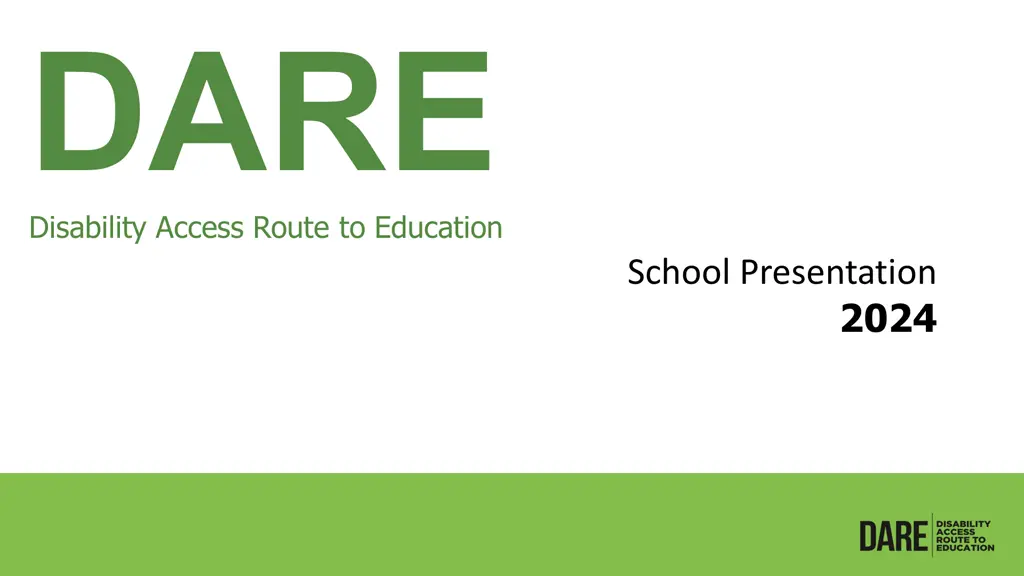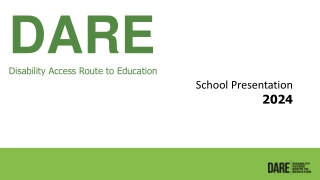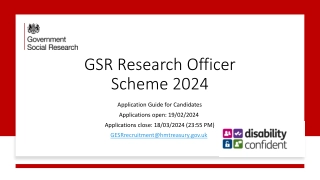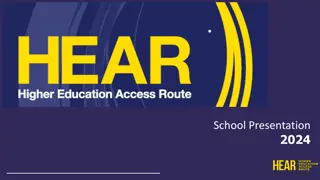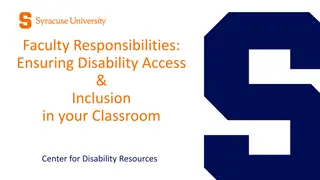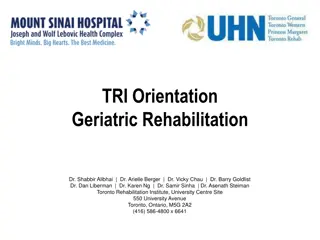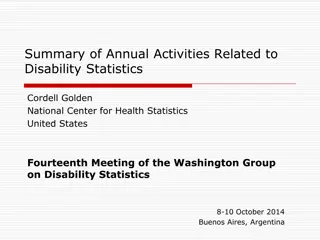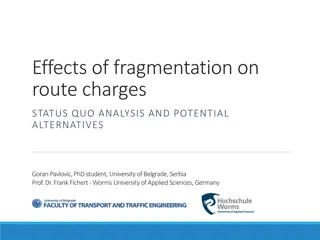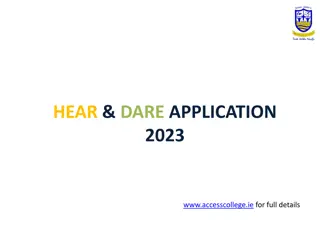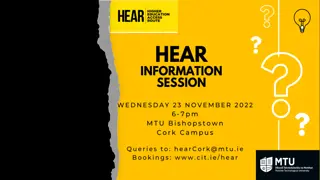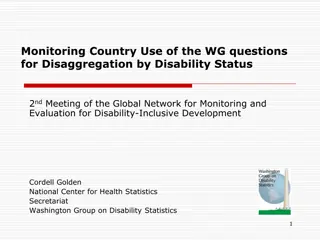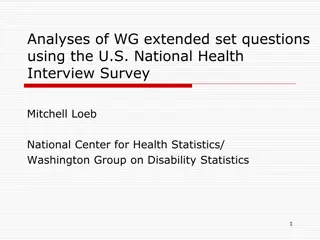DARE - Disability Access Route to Education
Discover the Disability Access Route to Education (DARE) and explore participating colleges. Learn how to apply and access reduced points places. Make a difference in college!
- DARE
- disability access
- college
- education
- application
- reduced points
- participating colleges
- make a difference
Download Presentation

Please find below an Image/Link to download the presentation.
The content on the website is provided AS IS for your information and personal use only. It may not be sold, licensed, or shared on other websites without obtaining consent from the author. Download presentation by click this link. If you encounter any issues during the download, it is possible that the publisher has removed the file from their server.
E N D
Presentation Transcript
DARE Disability Access Route to Education School Presentation 2024
Would YOU like to go to college? Where would YOU like to go?
How do I get there? How do I apply?
Have you heard of DARE?
Where can I go to college? Dundalk Institute of Technology ATU, Donegal ATU, Sligo St. Angela s College, Sligo. Maynooth University Pontificial University TUS, Athlone Dublin City University Institute of Art, Design & Technology, D n Laoghaire Marino Institute of Education NCAD National College of Ireland RCSI Trinity College, Dublin TU Dublin University College Dublin ATU, Galway University of Galway SETU, Carlow and Wexford Mary Immaculate College University of Limerick TUS, Limerick SETU, Waterford MTU, Cork campus University College Cork MTU, Kerry campus
Where can I go to college? www.accesscollege.ie/dare/participating-colleges/
There is something for YOU in college.
Arts Science Business Engineering Health Sciences Medicine IT
Clubs & Societies Athletics ..Gaelic Football . Mountaineering ..Drama . Film .Dance Volunteer Make a difference.
What is DARE? The Disability Access Route to Education (DARE) is a third level alternative admissions scheme for school-leavers whose disabilities have had a negative impact on their second level education. DARE offers reduced points places to school leavers who as a result of having a disability have experienced additional educational challenges in second level education.
Should I apply? If your disability has had a negative impact on your educational performance in school. You may not be able to meet the points for your preferred course due to the impact of your disability. You are under 23 years of age as at 1 January 2024.
Disabilities eligible for consideration Autistic Spectrum Disorder (including Asperger s Syndrome) ADD/ADHD Blind/Vision Impaired Deaf/Hard of Hearing DCD Dyspraxia Dyslexia/Significant Literacy Difficulties Dyscalculia/Significant Numeracy Difficulties Mental Health Condition Neurological Condition (Incl. Brain Injury & Epilepsy) Physical Disability Speech & Language Communication Disorder Significant Ongoing Illness
DARE Eligibility Criteria To be eligible for DARE you must meet both the DARE educational impact criteria and DARE evidence of disabilitycriteria. Applicants must provide the required evidence of their disability and provide an Educational Impact Statement from their school to be considered for DARE.
Educational Impact Has your disability impacted on a combination of the following? Have you received intervention or supports in post-primary school? 1. Has it impacted on your attendance or regularly disrupted your school day? 2. Has it affected your school experience and well-being? 3. Has it impacted on your learning or exam results? 4. Has it caused any other educational impact? 5. 6. Required for applicants with Dyslexia/Significant Literacy Difficulties or Dyscalculia/Significant Numeracy Difficulties: is it severely impacting on your literacy or numeracy skills?
Benefits of DARE Reduced Points An example: If the Leaving Certificate points for a course are 366 points, an eligible DARE applicant could be offered a place with a lower points score e.g. 356 points. Applicants need to meet entry and programme requirements to be considered for a DARE reduced points offer. The amount of points a particular course is reduced by is dependent on: The overall number of places on the course The number of reserved DARE places on the course The number of DARE eligible applicants competing for these reserved places. The reduction in points for DARE places can vary every year.
Benefits of DARE Orientation Programmes Exam Accommodations Learning Support Educational Support Worker Assistive Technology Academic Tuition Library Support You don t have to be eligible for DARE to get support in college. A needs assessment is conducted to identify your specific support requirements.
How do I apply? 1. Apply to CAO at www.cao.ie by 1 February 2024. 2. Review your DARE Handbook with your parents or guardians. 3. Complete Section A of the Supplementary Info Form and apply to DARE by answering Yes to Question 1 by 1 March 2024. 4. You should start gathering your documentation in a timely fashion, i.e. before 15 February. 5. Submit the Educational Impact Statement and Evidence of Disability to CAO by 15 March 2024.
Supplementary Information Form (SIF) Section A: Applicant Information Completed by you online by 17:00 on 1 March 2024. Answer Yes to Q1 to apply to DARE and fully complete Questions 1-5. OR Answer Yes to Q1(b) to apply to carry forward your DARE eligibility. Section B: Educational Impact Statement Educational Impact Statement completed by your school. Send to CAO by 15 March 2024. Section C: Evidence of a Disability Completed by the appropriate professional. Send to CAO by 15 March 2024. Section D: School Statement Where applying under the Dyslexia/ Significant Literacy Difficulties category, applicants who do not have a Psychological Assessment Report identifying Dyslexia should submit Section D. Send to CAO by 15 March.
Section B: Educational Impact Statement Provides information on how your disability has impacted on your second level education. Download form. Complete the Educational Impact Statement (EIS) Checklist with your school. Your school will complete the rest following on from your responses to the EIS Checklist.
Section B: Educational Impact Statement This form needs to be completed by either your: Guidance Counsellor Learning Support Teacher Year Head Visiting Teacher or Principal/Deputy Principal The form MUST BE signed and stamped by school Principal/Deputy Principal. You must return to the CAO by 15 March 2024.
Section C: Evidence of Disability Provides verification of your disability and helps to determine 3rd level supports. You can provide an existing report OR Complete Section C Evidence of Disability Form 2024. Get the form completed, signed and stamped by the appropriate professional or accompanied by their businesscard or headed paper. Applicants with Dyslexia/Significant Literacy Difficulties or Dyscalculia/Significant Numeracy Difficulties are asked to provide a full psychological assessment of any age completed by an appropriately qualified psychologist instead of the Section C Evidence of Disability form. Where applying under the Dyslexia/ Significant Literacy Difficulties category, applicants who do not have a Psychological Assessment Report identifying Dyslexia should submit Section D. GP Verification Your GP may be in a position to complete Section C Evidence of Disability, if they have the appropriate information on file from the Consultant/Specialist.
Section C: Evidence of Disability Age of Reports It is important to note that applicants applying under the following disability categories must provide a report that is less than 3 years old, i.e. dated after 1 February 2021. ADD/ADHD Mental Health Condition Significant Ongoing Illness
Section C: Evidence of Disability Psychological Assessment Applicants with Dyslexia/Significant Literacy Difficulties or Dyscalculia/Significant Numeracy Difficulties must provide a full Psychological Assessment Report of any age completed by a psychologist. Where applying under the Dyslexia/ Significant Literacy Difficulties category, applicants who do not have a Psychological Assessment Report identifying Dyslexia should submit Section D: School Statement in support of their application. AND Applicants with Dyslexia/Significant Literacy Difficulties MUSTalso have two literacy attainment scores at or below the 10th percentile (Standard Score of 81 or below). Applicants with Dyscalculia/Significant Numeracy Difficulties MUSTalso have one numeracy attainment score at or below the 10th percentile (Standard Score of 81 or below).
Section C: Evidence of Disability Continued. These attainment scores can be from one (or a combination) of the following sources: 1) Scores from school-based attainment testing 2) Scores from attainment tests carried out by a psychologist. Testing must have been carried out after 1 February 2022 and all applicants must submit an EIS completed by their school.
Section C: Evidence of Disability Check out the information on providing evidence of your disability on www.accesscollege.ie/dare/providing-evidence-of-your-disability You must post Evidence of Disability documentation to the CAO by 15 March 2024. Please keep a copy of all documents that you post to CAO.
Section D: School Statement If you are applying under the Dyslexia / Significant Literacy Difficulties Category but you do NOT have a Psychological Assessment Report identifying Dyslexia, then Submit section D: School Statement. Ensure that this is signed and stamped by the appropriate staff at your school. http://accesscollege.ie/dare/making-an-application/handbooks-forms/ You must post Section D to the CAO by 15 March 2024.
Helpful Tips Study the DARE Handbook carefully with your parents / guardians. Select Yes to Question 1 on the SIF before 5pm on 1 March. Ensure you speak to your Teacher early about the Educational Impact Statement. Request the required supporting documentation early. Send good quality copies of all pages of the correct documents. Submit all supporting documents requested by 15 March. Keep proof of postage. Deadlines!
Common Mistakes that affect DARE Eligibility Where the Section C form (Evidence of Disability) is completed by GP BUT the required copy of report by appropriate professional confirming diagnosis was not provided. Reports out of date Reports not confirming diagnosis of condition by consultant Incorrect professional completing Section C form or Evidence of Disability Report Test details missing (for example the name of the test, date or who conducted the test) Forgetting to complete Question 1 of the Supplementary Information Form by 17:00 on 1 March
Applying for a grant DARE is NOT the SUSI grant. . If you apply to DARE , you should also apply to SUSI if you think you may be eligible.
SUSI: Key Eligibility Criteria Nationality: Irish, EU, EEA, Swiss nationals or have specific leave to remain in the State. Residency: 3 of last 5 years in Ireland, EU, EEA or Switzerland. Progression in education NFQ levels 5-10. Approved College/Course Reckonable Income (Class - Dependent/Independent) www.susi.ie/undergraduate-income-threshold-and-grant-award-rates/
SUSI: Key Eligibility Criteria Check the website: www.susi.ie (Use Eligibility Reckoner) CAO form: Tick the SUSI option to share your college acceptance Apply early: April 2024 Return requested documentation: complete and on time Website: www.susi.ie Email: support@susi.ie Contact SUSI Facebook.com/susisupport Twitter.com/susihelpdesk Telephone helpdesk: 0818 888 777
DARE and HEAR Timelines DARE & HEAR closing date 1 March 2024 at 17:00 Supporting documents closing date 15 March 2024 Notification of eligibility Late June 2024 Review and Appeals Application Early July 2024 HEAR/DARE offers August 2024 College Orientation Late Aug /Early Sept 2024
Remember Submit it! Check it! Send it!
Remember You can apply to both DARE & HEAR Applicants who are both DARE and HEAR eligible will be prioritised by colleges when allocating reduced points places.
Virtual Application Information Days Saturday 13 January 2024 10am -2pm
DARE Application Outcome You will receive an email notification about your DARE application outcome once the Leaving Certificate examinations are over in late June. Log into your CAO application to view your DARE Application Outcome.
Further Information cao.ie susi.ie qualifax.ie
Follow us on. www.accesscollege.ie
